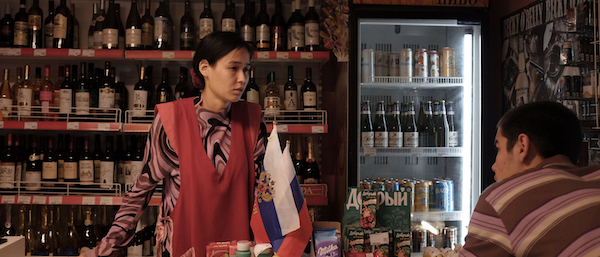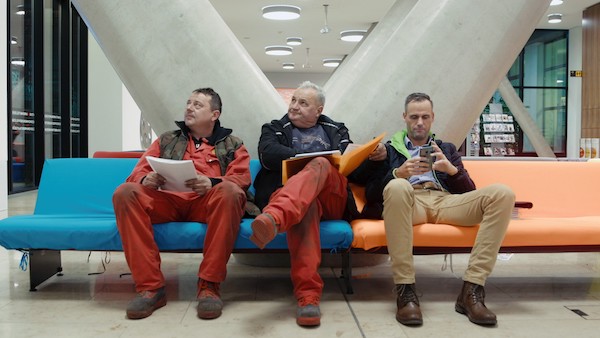Film Reviews: At the Berlin International Film Festival — Two Movies about Workers Under Assault
By David D’Arcy
Two stylistically different films in which workers are exploited and empowered.

Zukhara Sanzysbay, as Mukhabbat, in a scene from Convenience Store.
Michael Borodin’s drama Convenience Store, which premiered in Berlin without much promotional fanfare, is a gripping tale. (I watched that and other films in the 2022 Berlin International Film Festival via links in New York.)
Borodin also wrote the script for his first feature. It is the story of Mukhabbat, a young woman from the now-independent former Soviet republic of Uzbekistan. She left home to work with other Uzbek immigrants in a 24-hour store near Moscow, all drawn to the Russian capital with its promise of jobs, money, and opportunity. She’s treated abusively by customers, many of them drunks. She marries her husband on the premises, a few steps away from the alcohol shelves; the newlyweds sleep on the floor with all the other employees in a room behind the store. Aloof, quiet, largely unflappable, she works all hours, with no time off.
Here, as in other modern cities, immigrants keep a business going and keep its owner solvent. The police come by to take their share of the goods, seizing whatever they want. They are a cost of doing business — and of remaining employed.
Then things get worse: an Uzbek girl is raped, then tortured after she runs away. The workers don’t get paid. Mukhabbat has a baby, who is taken away from her. Even by the standards of immigrant exploitation, it’s hellish.
Convenience Store contains scenes that you might expect from shocking news investigations, exposés of the mistreatment of immigrants, if Russian media dared to report on those abuses. Mistreatment — slavery in most cases — is an open secret in Moscow and St. Petersburg, where immigrants from Central Asia and elsewhere stock shelves and wash dishes.
The Uzbek-born Borodin’s tale of immigrants exploited in the big city puts its characters in tight confined spaces. The lighting is cold, typical of refrigerators and narrow service passageways. Vodka, corruption, and violence heighten those claustrophobic conditions. In that narrow frame, physical constriction builds tension, offset when the camera cuts away to view the glittery kitsch spread around the shelves. You can almost smell the place — unappetizing meat that the employees pack by hand, cheap booze sold by the glass, and too many bodies in close proximity. The violence — as tactile as the cramped surroundings — can be unwatchable. Yet everything and everybody is watched, on security cameras that operate, like the store, 24 hours a day.
Borodin also charms viewers with unexpected dream sequences, beguiling visions that seem too soothing to be found in the store.
Confinement is one hardship Borodin’s film explores; centuries-old peonage is another. Mukhabbat’s escape from Moscow and her return to her native Uzbekistan shift the palette of Convenience Store. In the vast cotton fields under vast skies where women do the hard work, light barely penetrates the dust. Women toiling away here are eager to believe anything about Moscow, especially the promise of higher wages in the capital city. Mukhabbat knows better, but when her ailing mother suddenly needs to have her leg amputated — for a huge price, that she can’t pay — the young woman borrows money against a job that will take her back to Moscow, an immigrant once again.
Zukhara Sanzysbay, in the role of Mukhabbat, has a stoic elegance that resists the film’s grim fatalistic tug. Lyudmila Vasilyeva plays the middle-aged store manager Zhanna with the ruthlessness of a brothel madam who knows life better than her young charges do.
Yet the talent that emerges most clearly from Convenience Store is Borodin, whose eye for improbable details enlivens what could have been a stiff, dark moral tale. Imagine a scene where gravediggers bury Mukhabbat’s mother’s amputated leg next to her husband — a down payment? If the cotton field and cemetery look alike, it’s no coincidence.
Borodin had originally planned to make a documentary about cotton in Uzbekistan — a film that I and a dozen others would have wanted to see. In an interview, the director said that he and his team found so many shocking cases of immigrant enslavement that they had enough material for a five-year series. They found that some “employees” are held for longer than that.
Convenience Store is sure to travel to other festivals, maybe even to the US. Keep an eye out for its bland generic title. Its story (or stories) have enough striking parallels to the exploitation of immigrants in America that the idea of a US remake occurred to me. Mukhabbat, or a character like her, could be a plum role for an actress looking for a challenge.

A scene from the Austrian documentary For the Many.
At the other end of the Berlin International Film Fest spectrum was the Austrian doc For the Many, a look at an agency in Austria that protects workers’ rights (protection scorned by the Moscow police in Convenience Store). The AK, as it’s called, is the Arbeiterkammer Wien (Labor Office), which celebrated its 100th anniversary last year as it adapted to the crisis of Covid. The doc compresses interviews, complaints, meetings, and the day-to-day operations of the AK, including the challenge of Covid, into less than two hours — a haiku by Frederick Wiseman standards.
Director Constantin Wulf says his roots are in direct cinema, the auteur-wary observational approach pioneered by Canadians in the middle of the last century, a school of filmmaking broad enough to have included, among many others, Richard Leacock, D. A. Pennebaker, Albert and David Maysles, and — you guessed it — Frederick Wiseman.
Never pass up a chance to see a European working in what is essentially a North American style, at least for a look.
And it turns out this doc merits more than a look. As with Wiseman, Wulf films people who agree to be filmed. While it’s not an official institutional portrait, there’s no stealth or undercover footage here. For non-Austrians, the agency’s humane treatment of workers will be a revelation. We see an organization of dedicated employees who have been given the resources to serve the people who need them. Tell that to your local bureaucrats. This is a world away from Wiseman’s Welfare from 1975. And the AK’s building is immaculately clean.
Wulf’s For the Many has some elements in common with Wiseman’s City Hall, a 2020 doc about a city and a mayor trying to do better than Boston’s reputation would suggest. Still, hosting a talk with the best-selling socialist economist Thomas Piketty (who chats with AK staff at a public program) is a service that even the former mayor Marty Walsh didn’t provide, to my knowledge.
Citizens (clients or customers) in For the Many are treated with respect, and don’t wait all day to be seen. The building is new and welcoming. Clerks speak German, Serbian, Hungarian, and other languages to people who are desperate for assistance. Why so desperate? In encounter after encounter, we hear workers complain about clerks being fired, underpaid or not paid at all, or treated abusively. Their faces, pained and exhausted, convey the news with sobering credibility. At least in Vienna there’s a place to address unfair treatment.
Unfortunately, the film’s title, For the Many, overestimates this film’s potential audience in the US. Still, it will turn up at doc festivals, and fans of direct cinema and its legacy should seek it out.
David D’Arcy lives in New York. For years, he was a programmer for the Haifa International Film Festival in Israel. He writes about art for many publications, including the Art Newspaper. He produced and co-wrote the documentary Portrait of Wally (2012), about the fight over a Nazi-looted painting found at the Museum of Modern Art in Manhattan.

